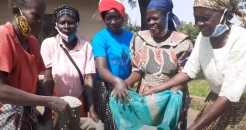 Preparing widows to lead positive social transformation
Preparing widows to lead positive social transformation
From an initiative by Nyanam International
Nyanam is a restorative justice organization in Kenya that prepares widows to lead positive community transformation through holistic programs in leadership, health, livelihoods, justice, and youth education. The organization’s work alleviates widowhood poverty and stigma, mitigates the impact of HIV/AIDS, and provides widows with the tools to tackle oppressive cultural, economic, and social practices that undermine their dignity and limit their agency. Nyanam’s vision is an Africa where widows thrive.
In Kenya there are an estimated 8 million widows who comprise 15% of the total population. Despite being a prominent proportion of the country’s population, widows were not at all mentioned in the National Census Report of Kenya until 2019. These women remain invisible in the eyes of many policymakers, yet they have the most to gain from social and political support. Since marriage remains the primary basis by which women access social and economic rights in Kenya and much of Africa, Nyanam aims to amplify the voices of the many women who lose this stability and authority as a result of their widowhood.
As a result of their disadvantaged social position, widows are vulnerable to many socioeconomic and health issues. Sexually exploitative practices are commonly experienced by Kenyan widows. These practices are not only emotionally and psychologically harmful, but they also often put the widows at risk for contracting HIV/AIDS. Through no fault of their own, widows are socially stigmatized and deprived of respect and humanity. Yet, as a community, these women have great responsibilities; 7 in 10 African widows are the heads of their families. These women are important community members and despite the challenges, they display powerful resilience and strength.
The inception of Nyanam came as a result of a widow advocating for more social support aimed at the needs of women like her. Widows want to change the cultural norms and practices that hinder their ability to live their full potential, and Nyanam is dedicated to helping them realize these goals.
Widows in Africa often have no rights to ownership of their husband’s property. In many cases, widows may endure “property grabbing” or eviction from their homes, and the land may be claimed by their late husband’s male family members. With the loss of home ownership and land, the widows are limited in their ability to grow food, take care of their children, and maintain their livelihood. Many experience loneliness, isolation, neglect, and even rejection from their relatives. Widows are also subject to chronic poor health as a result of inadequate nutrition, housing, lack of clean water, and trouble accessing healthcare in rural Kenya. The challenges widows face are further exacerbated by illiteracy and a lack of education and training. Illiteracy denies widows employment opportunities and increases their exploitation in legal and official processes.
Nyanam use a holistic approach to build the mental, physical, emotional and spiritual strength of widows. Their Bible-informed training centres on the stories of widows in the Bible to inspire reflection and action to promote social justice for widows.
Since 2019, their impact has been:
-
1400 widows inducted and organized in 63 leadership circles.
-
754 kitchen gardens established by widows in their homes
-
668 widows trained in leadership, health, agriculture, microbusiness and land justice
-
3004 youth (children of widows) reached and trained in technology, climate change, sexual and reproductive, physical, and mental health
-
375 community leaders trained in land rights and succession
-
200 multistorey gardens established by widows
-
1257 group counselling sessions conducted
-
$3958 microcredits provided to Nyanam widows for their table banking
-
140 widows' children offered need-based secondary school scholarship
-
7 three- roomed modern and dignified houses built for Nyanam widows
Watch this 3 minute video:
Retweet about this article:
From an initiative by Nyanam International, 15/01/2025